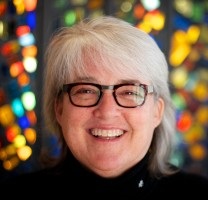By Bob Allen
The pastor of a Kentucky Baptist church making national headlines for changing its wedding policy to include same-sex couple admits he is a little surprised by all the attention.
“This seems like big news for us, but not for the larger culture,” Pastor Joe Phelps of Highland Baptist Church in Louisville, Ky., said of a recent decision by the deacons to allow a same-sex couple who are members of the church to be married at Highland next May.
Phelps surmised that headlines in media including the Louisville Courier-Journal, USA Today, public radio and numerous websites dedicated both to gay-rights causes and Christian news might have something to do with a recent court decision striking down Kentucky’s ban on gay marriage and similar cases across the country.
Nearby Crescent Hill Baptist Church in Louisville made a similar decision over a year ago, after a two-month discernment process that went unnoticed by the media.
For Nancy Petty, pastor of Pullen Memorial Baptist Church in Raleigh, N.C., the question is, “What took so long?”
Members of Pullen Memorial voted to bless the union of a same-sex couple on March 1, 1992. The move, along with an April 5, 1992, vote by Olin T. Binkley Memorial Baptist Church in Chapel Hill, N.C., to license a gay man to the ministry, sent shockwaves through the Southern Baptist Convention.
Messengers to the 1992 SBC annual meeting in Indianapolis acted to declare both congregations “not in friendly cooperation” with the denomination. From there the convention amended its constitution to exclude from membership any churches that “act to affirm, approve or endorse homosexual behavior.”
“Twenty-two years later!” Petty marveled at the headlines. “It amazes me that it has taken this long for churches to do what the gospel calls us to do as God’s people.”
“The message of Jesus could not be clearer in our sacred scriptures: we are to be God’s radically inclusive people in the world,” Petty said. “With that said, it’s never too late to start being who we are called to be as the church.”
 Robin Lunn, executive director of the Association of Welcoming and Affirming Baptists, formed in 1993, said for those long on the front lines for LGBT equality seeing the issue time after time treated as something new is like watching reruns of the movie Groundhog Day.
Robin Lunn, executive director of the Association of Welcoming and Affirming Baptists, formed in 1993, said for those long on the front lines for LGBT equality seeing the issue time after time treated as something new is like watching reruns of the movie Groundhog Day.
“They are getting tons of attention for something that our organization has been doing for 20 years,” Lunn said.
Lunn said “it’s always a good thing” when a Baptist church is recognized for bucking the tradition of keeping gay members in the closet, but she wishes more churches like Highland would join AWAB. She said the ministry’s philosophy is that a collective voice is louder than that of a single church, and the more voices the better.
Petty said she is reminded of a seminary professor who told her “the church rarely leads society to live the gospel but rather society often drags the church into being who we are supposed to be.”
“I think an important question for the church today is this: Is the church influencing the community on spiritual, ethical and moral issues facing our world or is public debate and policy influencing the church when it comes to taking spiritual, ethical and moral stands?” Petty said.
“If the church is going to live up to its prophetic mission and be relevant in the world it is going to have to take more risks in speaking out on issues such as marriage equality, the environment, immigration reform, cradle-to-prison pipelines, voting rights, health care for all and a whole host of other critical issues facing an ideology of American exceptionalism.”
Lunn said the growing acceptance of gay marriage is one more example of the church lagging behind the rest of society when it comes to cultural change.
“The church right now is not at the front end of anything,” she said. “It is being led around by society.”
Lunn said many of the churches that were on the leading edge of the issue of LGBT equality have moved on to other leading edges.
 Petty’s church, for example, has been active in the Moral Monday protests in North Carolina, which began in opposition to a voter ID law and have expanded into activism on issues including Medicaid expansion, women’s health and the environment.
Petty’s church, for example, has been active in the Moral Monday protests in North Carolina, which began in opposition to a voter ID law and have expanded into activism on issues including Medicaid expansion, women’s health and the environment.
Petty said she believes a generation of young people has gotten the message on marriage equality, and churches are starting to figure out that if they don’t get on board there will be no church in the future.
“Sadly, I think the church is now responding to the influence of public debate and policy on the issue of marriage equality,” she said. “If public policy was headed in the opposite direction — against marriage equality — I have to wonder if some of these churches would be taking the risk they are now taking.”
“In reality, I imagine that the answer to my question is not either/or but both/and,” Petty said. “In my more gracious moments I would say that faith and culture are in dialogue and having dual influence.”
“My passionate side wants the church to be bolder, more courageous and take more risks when it comes to being God’s radically inclusive people,” Petty said. “Rather than reacting and responding to the world, I want the church to set the tone and be a leader for what it means to be God’s people in the world.”
